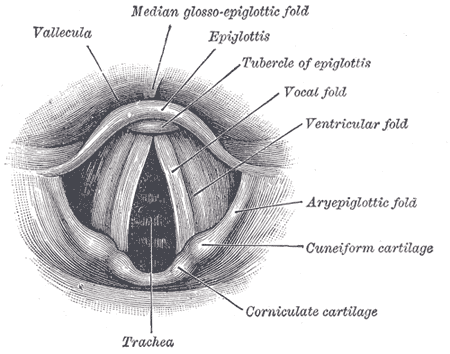Reviewer: S. Randhawa, M.D., Allergist/Immunologist and Assistant Professor at LSU (Shreveport) Department of Allergy and Immunology
A 35-year-old Caucasian male (CM) is at the allergy clinic here for a followup of allergic rhinitis and asthma. He reports no symptoms of asthma apart from occasional chest tightness when he does his usual exercise routine, which consists of running. He reports no night symptoms, no emergency room visits, and no steroid tapers. His nasal congestion is well controlled with nasal steroids. The patient reports dysphonia, history of “losing his voice,” as he describes it, especially in the afternoon. This started approximately three months ago. He has been on inhaled corticosteroid for 8 months. He does report rinsing his mouth after he uses the inhaled steroid and no symptoms of oral candidiasis.
Past medical history (PMH)
Asthma, allergic rhinitis
Medications
Advair 250/50 b.i.d., Allegra 180 mg po daily, Veramyst 1 spray daily.
Social history and family history
Not contributory.
Physical examination
Vital signs stable.
Skin: Normal. Eyes: Normal. Nose: Pale, boggy turbinates. Throat: Normal. Chest: clear to auscultation bilaterally. Cardiovascular system: Clear S1, S2. Abdomen is soft, non-tender, non-distended.
Laboratory results
The patient had a mild obstructive defect on the spirometry with no reversibility. His FVC was 100% before four puffs of albuterol and increased to 107%, a 7% change. His FEV1 was 88% of predicted and increased to 98% of predicted, 6% change with four puffs of albuterol. The absolute increase was from 3.25 to 3.45 L. He had another negative bronchodilation test 8 months ago.
What is the most likely cause of the patient's dysphonia?
Steroid inhaler induced laryngitis.

Laryngoscopic view of normal vocal folds. Image source: Wikipedia, Gray's Anatomy, public domain.
What treatment would you suggest?
This is a patient with symptoms of cough and dyspnea on exertion, but no conclusive evidence of asthma. There was no significant FEV1 increase on the bronchodilatation test done last year and the one today.
He also has symptoms of dysphonia, which could be due to steroid induced laryngitis. We advised the patient to stop the Advair and he will be scheduled for a methacholine challenge test in two weeks.
We will reevaluate him in two weeks. If his dysphonia has not resolved by that time, we will arrange for ENT consult.
Final diagnosis
Steroid inhaler induced laryngitis.
Summary
Asthma is the most common chronic respiratory disease, affecting up to 10% of adults and 30% of children (JACI, 2011).
Steroid inhaler laryngitis is a form of chemical laryngopharyngitis induced by topical steroid administration. Symptoms and physical findings mimic laryngopharyngeal reflux, but only respond completely to discontinuation of the inhaled steroid therapy.
In a study of 255 outpatients using pressurized aerosol inhaled corticosteroids and 100 controls, 58% patients taking inhaled steroids reported voice dysphonia or throat symptoms compared with 13% of control patients.
Allergists should be familiar with steroid inhaler induced laryngitis as a cause of dysphonia.
Differential diagnosis of cough, a simple mnemonic is GREAT BAD CAT TOM. Click here to enlarge the image: (GERD (reflux), Laryngopharyngeal Reflux (LPR), Rhinitis (both allergic and non-allergic) with post-nasal drip (upper airway cough syndrome), Embolism, e.g. PE in adults, Asthma, TB (tuberculosis), Bronchitis, pneumonia, pertussis, Aspiration, e.g foreign body in children, Drugs, e.g. ACE inhibitor, CF in children, Cardiogenic, e.g. mitral stenosis in adults, Achalasia in adults, Thyroid enlargement, e.g. goiter, "Thoughts" (psychogenic), Other causes, Malignancy, e.g. lung cancer in adults).
References
Steroid inhaler laryngitis: dysphonia caused by inhaled fluticasone therapy. DelGaudio JM. Arch Otolaryngol Head Neck Surg. 2002;128:677-681.
Frequency of voice problems and cough in patients using pressurized aerosol inhaled steroid preparations. IJ Williamson, SP Matusiewicz, PH Brown, AP Greening, and GK Crompton. Eur Respir J 1995; 8: 590-592.
Dysphonia caused by inhaled steroids: recognition of a characteristic laryngeal abnormality. A J Williams, M S Baghat, D E Stableforth, R M Cayton, P M Shenoi and C Skinner. Thorax 1983;38:813-821; doi:10.1136/thx.38.11.813.
Published: 03/17/2009
Updated: 01/17/2012
4 comments:
How do we deal with steroid inhaler induced laryngitis. Is this a reversible condition. Is this a contraindication for future use of steroid inhalers
Good question. I lost my voice entirely from Advair some years ago and switched from Aerobid (which was discontinued) to Flovent in mid-October (about two months ago)and am having lots of problems now. I haven't been advised to switch to another steroid yet and am beginning to wonder if my dysphonia will ever go away even if I do get off of Flovent. Any information is much appreciated.
can we think of tapering the dose of steroid then
uttam
I have been on Advair for a year due to asthma and am finding the same problem. I love to sing but this is proving impossible. I have experimented with gargling with various mouth washes but none was successful. I found a better but limited success with equal parts of honey and water. It helps to gargle before and after using my inhaler.
Post a Comment